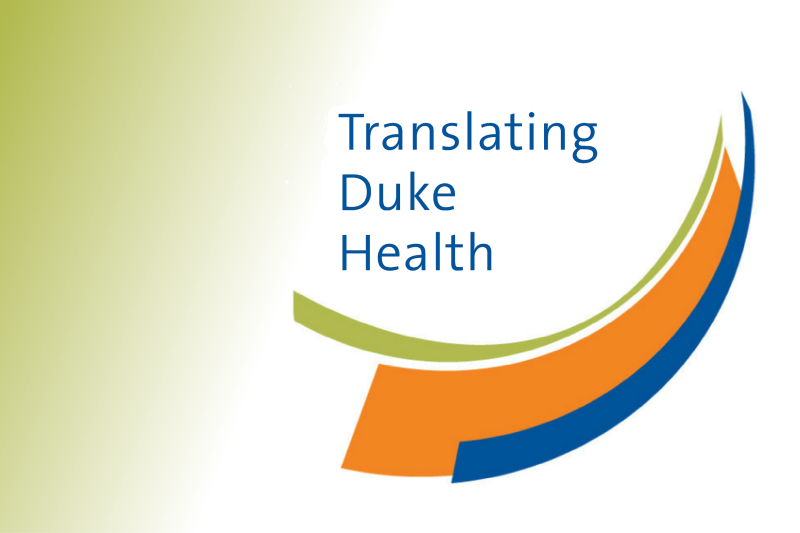
Just a year after its launch in September 2017, the Translating Duke Health Initiative has already funded 14 innovative pilot projects aimed at accelerating knowledge in cardiovascular disease, children’s health, brain metastasis, brain resilience, and immunology.
The Translating Duke Health Initiative is a multi-year commitment by Duke Health leadership to fund research projects aimed at improving healthcare in five key areas of medicine where expedited research has the potential to be most impactful to society. Each area – or pillar - is governed by a faculty leader and community of scientists.
Last fall, the faculty leaders of each pillar called for pilot project proposals that emphasized interdisciplinary collaborations and had the potential to lead to future funding from external groups.
Awardees received grants in amounts of up to $480,000 to pursue their projects, and each initiative awarded between two and four grants. The recipients were:
Immunology:
- Eileen Chambers, Pediatrics; and Qing Cheng, Surgery: “A novel genomic approach to renal allograft rejections”
- Rebecca Sadun, Medicine; Akiko Watanabe, Immunology; Eugene William St. Clair, Medicine; Garnett Kelsoe, Immunology; and Kingshuk Roy Choudhury, Radiology, Biostatistics and Bioinformatics: “Autoreactive Memory B Cells as Drivers of SLE”
- Nancie MacIver, Pediatrics; Deepak Voora, Medicine, and Melinda Beck, UNC Gillings School of Global Public Health: “Metabolic reprograming of lymphocytes in obese human subjects”
Children’s Health:
- William Copeland, Psychiatry and Behavioral Sciences; Jane Costello, Psychiatry and Behavioral Sciences; and Alaattin Erkanli, Biostatistics and Bioinformatics: “Intergenerational transmission of resilience to adverse childhood experiences”
- Charlene Wong, Pediatrics; Sarah Armstrong, Pediatrics; Gary Bennett, Psychology and Neuroscience; Peter Ubel, Business Administration, Public Policy, Medicine: “Incentivizing an integrated community-clinic pediatric obesity treatment program”
- Noelle Younge, Pediatrics; Charles Wood, Pediatrics; Elizabeth Hauser, Biostatistics and Bioinformatics; Patricia Ashley, Pediatrics; Sarah Armstrong, Pediatrics; Christopher Newgard, Medicine, Pharmacology and Cancer Biology, Nutrition, Biochemistry; and Charles Michael Cotten, Pediatrics: “Extremely preterm infants cohort: mechanisms of early life growth failure and its impact on early childhood outcomes”
- Alexander Allori, Surgery; Jonathan Routh, Surgery; Hayden Bosworth, Population Health Sciences, Psychiatry and Behavioral Sciences, Medicine; Benjamin Goldstein, Biostatistics and Bioinformatics; Jillian Hurst, Pediatrics; Joao Vissoci, Neurosurgery; Amelia Drake, UNC School of Medicine; Jeyhan Wood, UNC Health; and Lisa David, Wake Forest Baptist Health: “Exploratory analysis of provision and utilization of multidisciplinary team-based and community-based care for cleft lip and/or palate in NC”
Cardiovascular Disease:
- Ravi Karra, Medicine; Andrew Nixon, Medicine; Sudarshan Rajagopal, Medicine; Howard Rockman, Medicine, Cardiology, Molecular Genetics and Microbiology, Cell Biology; Joseph Rogers, Medicine; G. Michael Felker, Medicine: “Biomarker signatures of ventricular resilience”
- Deepak Voora, Medicine; and Geoffrey Ginsburg, Medicine: “Resilience to coronary artery disease risk factors”
- Richard Boortz-Marx, Anesthesiology; Manesh Patel, Medicine; Marat Fudim, Medicine; Adrian Hernandez, Medicine; Arun Ganesh, Anesthesiology: “Splanchnic nerve blockade for treatment of chronic heart failure”
Brain Metastasis:
- Anne Marie Pendergast, Pharmacology and Cancer Biology; Peter Fecci, Neurosurgery; Kris Wood, Pharmacology and Cancer Biology: “Identification of actionable signaling networks that promote breast cancer metastasis to the brain”
- Peter Fecci, Neurosurgery, “Countering Exhaustion: Awakening the T Cell Response in Brain Metastases”
Brain Resilience:
- Scott Soderling, Cell Biology, and Al LaSpada, Neurology: “Altered protein trafficking as a shared pathway in Parkinson’s Disease: Identifications and validation of the pathogenic proteome”
- Alison Adcock, Psychiatry and Behavioral Sciences, and Nancy Zucker, Psychiatry and Behavioral Sciences: “Learned neuromodulation of catecholamine projects systems to improve brain resilience to stress in perfectionistic young adults”
“Translating Duke Health is catalyzing new high-impact collaborations to better capitalize on our collective strengths in research, clinical care and population health,” said A. Eugene Washington, MD, Duke’s Chancellor for Health Affairs and the president and Chief Executive Officer of the Duke University Health System. “And we are excited about the promise of TDH endeavors to help solve some of society’s most burdensome health problems.”
“The Translating Duke Health Initiative is just one example of the ‘One Duke’ philosophy,” said Mary E. Klotman, MD, Dean of the School of Medicine. “Faculty from across the school bring different experiences and expertise so that they can work together to do the most innovative science. That’s the beauty of this important initiative.”